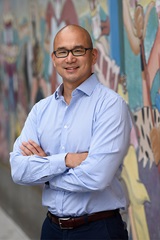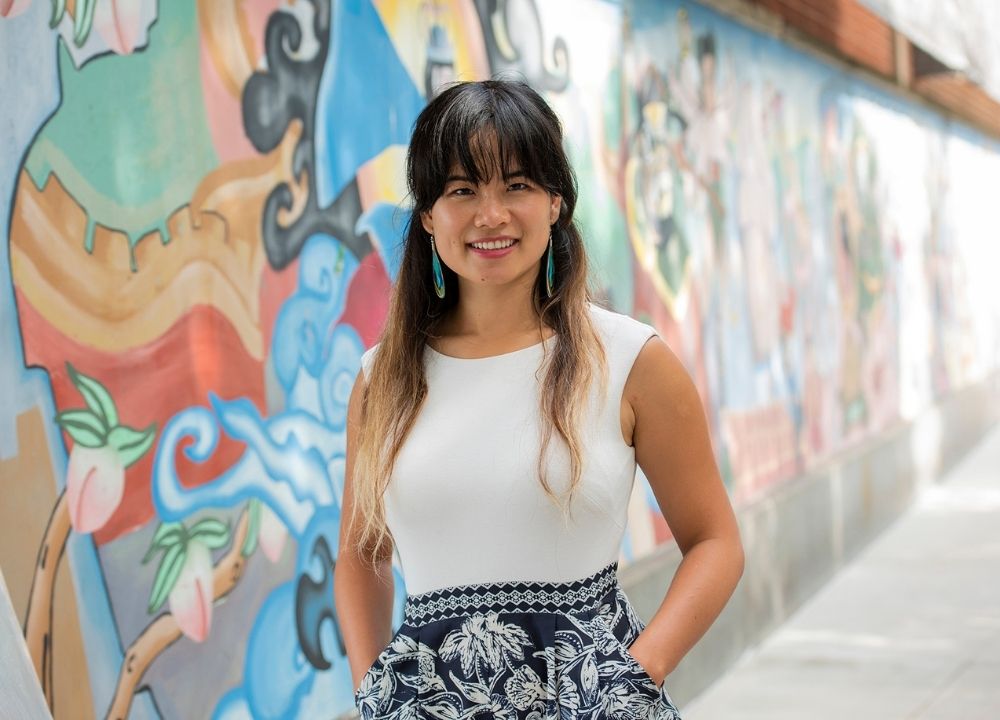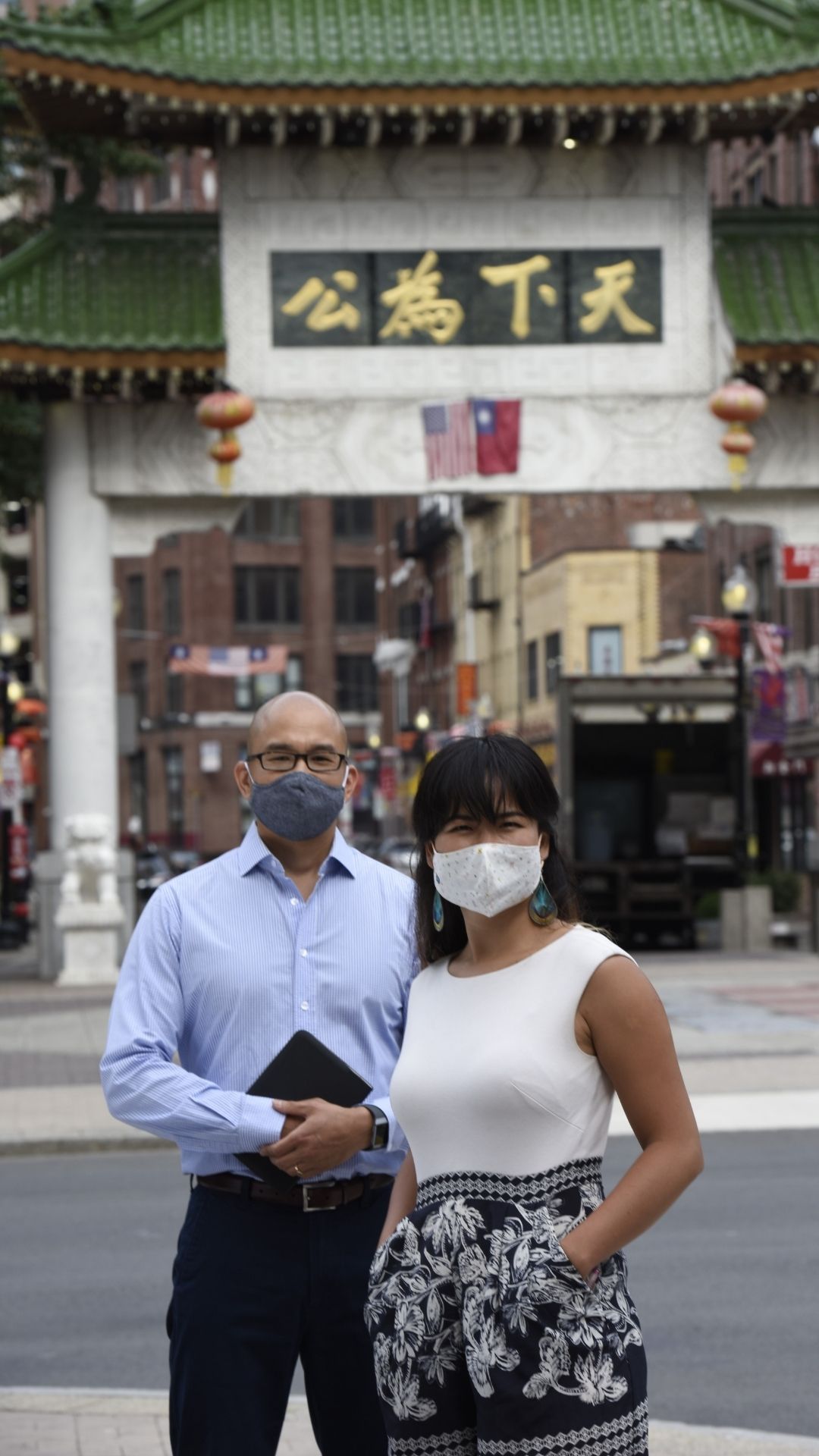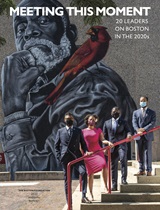Pathways to Leadership
Yanyi Weng
Boston Chinatown Neighborhood Center
Tell us about your background and yourself. You grew up in Chinatown, right?
Yes, my Mom, my brother and I came to the U.S. to join our father when I was 12. I went to the Quincy Elementary School, the middle school, and eventually I got into Boston Latin Academy, so I went there for middle-school and high school, and then I went to Boston College and graduated. Then I went back because I can’t leave that place! I went back to BC to get my Master’s in Social Work. I’ve been working in hospice since last year. I just passed my one year. It’s called Good Shepherd Community Care and we do home visits. It involves not just meeting the patient, but also their home and their family. There’s so much history you learn.
What drew you to this work?
I always have worked with nonprofit organizations. In the past, I’ve worked at the Asian Task Force Against Domestic Violence as a human advocate. That’s when I started to learn more about the cultural gap, in terms of providing services to people in the community and people of color who have a hard time navigating the system and the language barriers. But I needed to learn more, so I went to grad school. I was interested in the elderly. Then life threw a curve ball at me. I met my future husband then. I got married in grad school. I also went back to work for Asian Task Force Against Domestic Violence to gain more experience. Eventually I got involved in clinical work because my advisor told me that you have to do clinical work. So, I graduated and got my clinical degree.
I knew that to work for an agency and a friend suggested I come and work hospice. I had only taken one class in hospice, which was called Death and Dying. It’s very meaningful work. I went to church most of my life and while I was in college.
My father passed when we first came to the U.S., and that’s how I got involved with BCNC (Boston Chinatown Neighborhood Center). BCNC is my surrogate father. They helped to nurture me and invest in me and believe in me. I think that a lot of things in my life have led me to hospice social work. For example, my grandfather was having dementia and we didn’t know what was going on. My brother was the one who did the research and told us that grandfather was experiencing dementia.
There are other times, such as when my father went to Tufts to receive chemotherapy. At the time, I was too little to understand, but later I interned on the same floor at Tufts. My work resonates with what I love to do, which is providing care for people in the comfort of their homes and providing the services they need and the language interpretation. It’s very meaningful work. I work mostly with Asian clients and I speak Toisanese, which is actually a very big population. It’s from southern coast and during the early 1800s, that’s when many people moved here. They helped to build the railroad. So, for me to know history means a lot. My ancestors and people from my region have contributed a lot to this country. Nowadays, a lot of the elders in Chinatown speak Toisanese. Many of them immigrated here because they had relatives and the immigrants tend to stay together. A lot of people are moving to Quincy because of gentrification in Chinatown.
Now because of the pandemic, we are doing a lot of our work by phone and online. We got training in PPE, and now I’ve just started home visits once again.
What is the bigger picture for you? You’re doing this very important personal work with people, but if you pull back from that, what do you think is the most serious challenge in that time of life? What would help to improve your work and the goals that you have?
I consider myself to be a “big picture” person and from that point of view, I hear a lot about skilled nursing facilities and how the quality has gone down. There is a lot of mistrust about skilled nursing facilities because of the language barriers. The families feel they are not being heard. But there is one called South Cove Manor, which is the mecca. It’s a very beautiful place. They haven’t even had one case of COVID-19 even though Quincy has been very hard hit. They have very strict protocols for the staff. It’s very high quality. Everyone wants to go there but there aren’t enough beds.
I’ve been thinking about what it means for me to see the need and ask myself, “How do I contribute?” When I have visited a lot of nursing homes, the smell is way too strong. It’s horrific. I don’t think that poor, Chinese immigrants should go through that. Just because they don’t have the means doesn’t mean that the infrastructure should be such poor quality.
To know how to live is to know how to die and that’s exactly what it means for us as a society. If we don’t take care of our elderly, then we can’t function well as a society. Because eventually, everyone is going to get to that point. I think it’s very important to understand how hospice works. In the Chinese culture, there has always been a superstition about dying at home. People say it’s not good luck. They want them to stay in the hospital, but the hospitals are sending them out because there is no other treatment. So that’s where hospice comes in and we have to explain to the family that we can provide better care.
So, you’re concerned about having more respect for the elderly, but on a specific level, having better long-term care.
When I walk into skilled nursing facilities, I wonder to myself, “Would I send my grandmother here? Would I ever want to come here?” And the answer is “no.” It’s hard to know that we are in a country that has more resources than any other country in the world and yet the treatment of our elders is not up to basic standards. Imagine if there were more places—or all places—like South Cove. That’s such a beautiful image.
That’s a huge national issue.
Yes, I know. Sometimes I tell my husband I’m going to run for political office someday. I have issues that I care about and I have a loud voice. If I see something that’s not right, I’m not afraid to call out things. And I feel that my grounding in my community of Chinatown has really given me the confidence. In Chinatown, people protest to save Chinatown buildings and against gentrification. That is people power! It’s amazing. I also do photography and I went to a Black Lives Matter demonstration and photographed that. I want to use photos for healing and storytelling. One of the things I want to do with my photography is to project the voices of Asian Americans, to share all of their experiences.
I’ve also been involved with a professor at Boston University named Judith Scott, who is doing research about immigrant parents and the way they are disciplining their children. I work as a research assistant for her. We’ve been working on that research for over a year now and BCNC is our partner. We’ve interviewed some Chinese parents in the community and we’re disseminating information about what we learned and how to respond during COVID-19. And we conducted the interviews in Chinese—Cantonese and Mandarin.
"I want to see more money going into mental wellness for people of color. For people in the younger generation it’s hard for them to communicate with their parents [...]. Asian Americans have a lot of mental struggles over xenophobia and racism especially, but they don’t have the space to share that."
I also really enjoy being a therapist for Asian Americans. My friends and I have a private therapy practice.
You asked about an idea I have for the next 10 years. I want to see more money going into mental wellness for people of color. For people in the younger generation it’s hard for them to communicate with their parents, so there are a lot of communication barriers. Asian Americans have a lot of mental struggles over xenophobia and racism especially, but they don’t have the space to share that. So, it’s very important for the community to have that space. So that’s what my friends and I do. Our practice is called Elephant in the Room Counseling. We speak Mandarin, Cantonese, Toisanese and Thai. One of my biggest passions is to provide that space and that oasis for people to go to when they are struggling through intimate moments. That practice is the only one focused on Asian Americans in Boston; maybe even in New England.
Many people come to me because they lost their jobs due to COVID-19 and therapy is a luxury they can’t afford. And they don’t have insurance, but they need help.
I’m just someone who wants to do everything. Perhaps the life experience I went through when I lost my father; there were so many people around me who helped me, that I really felt that it’s my life mission to give back as much as I can. Whether it’s in the health care system, education or in the mental wellness area. When I helped with fundraising for the Boston Marathon, I learned about resource allocation and I realized that there are so many people out there with money who are willing to help a good cause.




